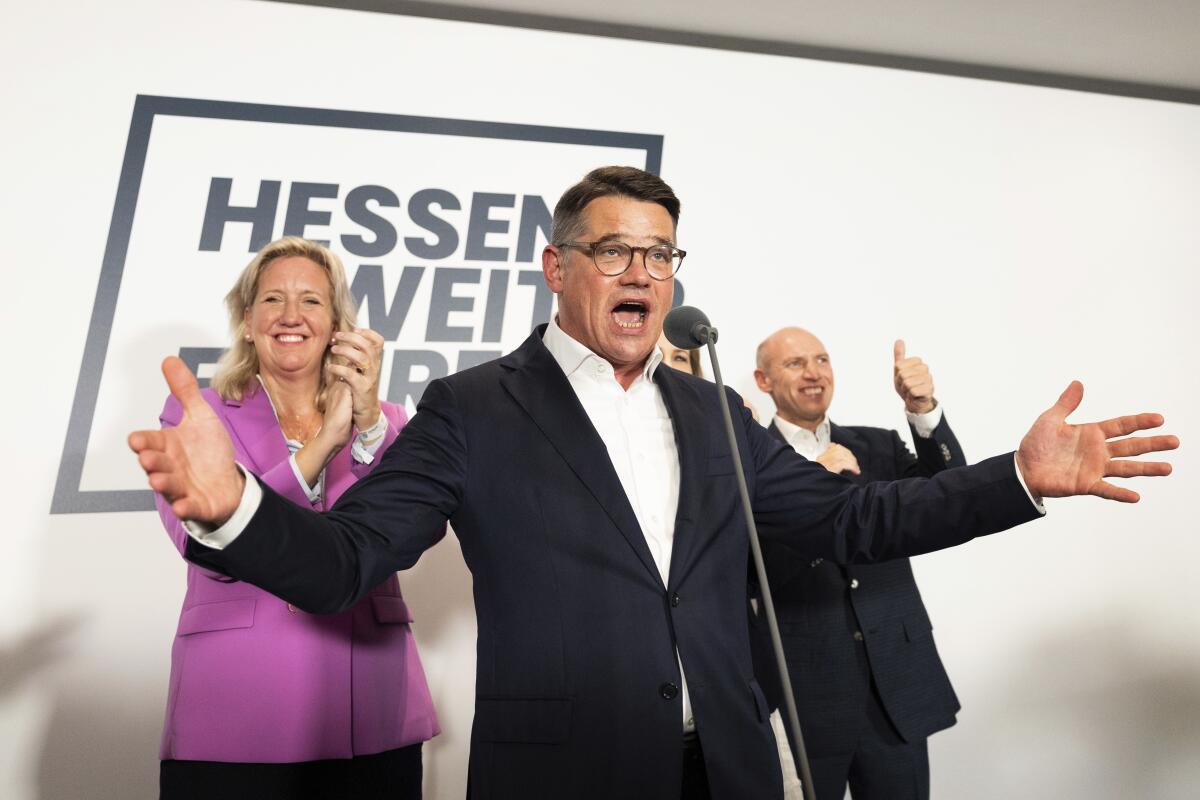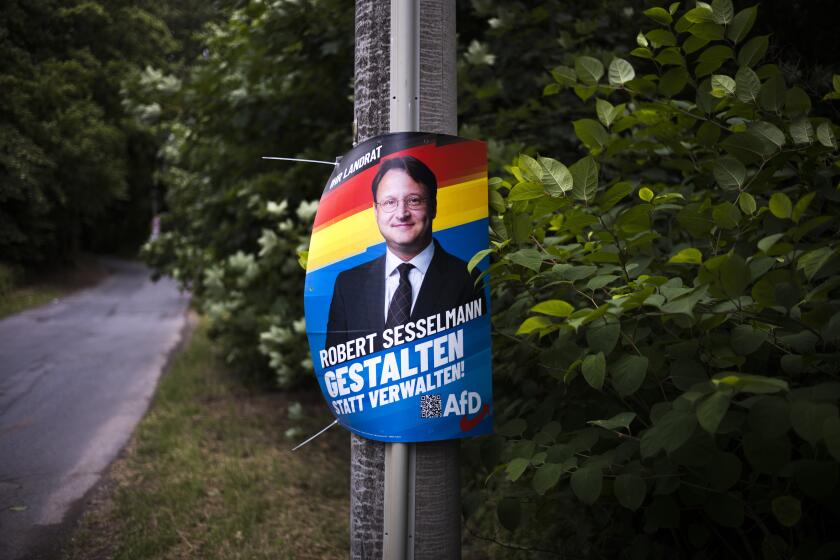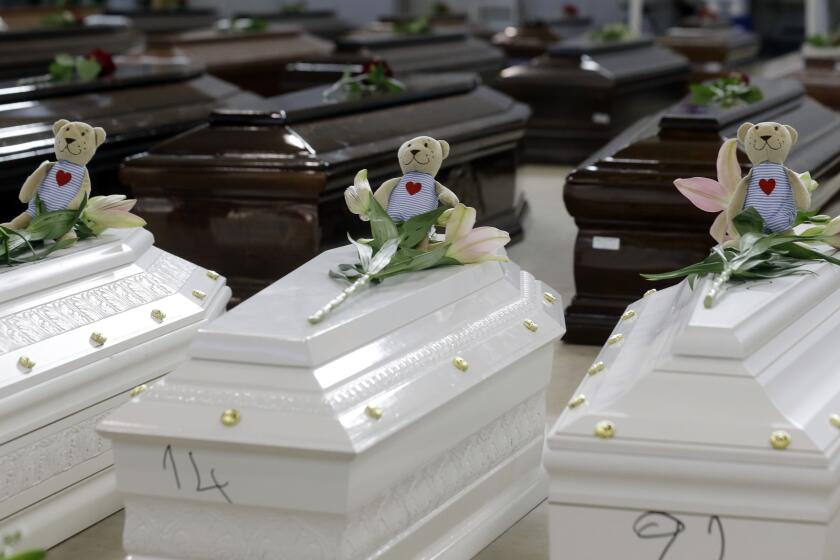German center-right opposition wins 2 state elections, with far right making gains

- Share via
BERLIN — Germany’s center-right opposition won two state elections on Sunday at the halfway mark of Chancellor Olaf Scholz’s unpopular national government, projections showed, and a far-right party that has been riding high in national polls celebrated gains.
The votes followed a campaign marked by discontent with persistent squabbling in the national government and by pressure to reduce the number of migrants arriving in Germany. The national interior minister, who leads the federal response on migration, suffered a heavy defeat in a difficult bid to become governor of her home state.
About 9.4 million people were eligible to vote for the new state legislature in Bavaria and around 4.3 million in neighboring Hesse, a region that includes Germany’s financial capital, Frankfurt. Both states were already led by the country’s main opposition Union bloc, made up of the Christian Democratic Union and the Bavaria-only Christian Social Union.
Projections for ARD and ZDF public television based on exit polls and well-advanced counting showed the Christian Social Union, which has led Bavaria since 1957, extending that run with support of nearly 37% — little changed from five years ago and around 20 points ahead of its nearest rival. In Hesse, the Christian Democratic Union was seen winning about 34% of the vote, making gains and also far ahead of its rivals.
The far-right Alternative for Germany party, which has risen to second place in national polls behind the Union, won’t be a factor in determining the states’ new governments, as other parties refused to work with it.
The election of the first head of a county administration by the far-right Alternative of Germany in a region has led to concern among opponents.
But it looked likely to finish second in Hesse and possibly also in Bavaria. Projections showed it taking about 18% of the vote in Hesse and 16% in Bavaria, improving significantly on lower double-digit showings when the two states last voted in 2018.
They showed disappointing results for the three national governing parties — Scholz’s center-left Social Democrats, the environmentalist Greens and the pro-business Free Democrats. Hesse’s conservative governor, Boris Rhein, was challenged by both his current Green deputy and by the Social Democrats’ candidate, national Interior Minister Nancy Faeser.
But neither came anywhere near loosening the Christian Democratic Union’s 24-year hold on the job. The projections showed them each with about 15%. Leading Social Democrats made clear that they still back Faeser as interior minister.
Officials across Germany are sounding the alarm that they are no longer able to accommodate migrants who are applying for asylum in rising numbers.
Scholz’s governing coalition has turned off voters with repeated public squabbling, notably on a plan to replace fossil-fuel heating systems with greener alternatives.
The projections showed the Free Democrats falling short of the 5% support needed to stay in Bavaria’s state legislature and uncertain of hitting that mark in Hesse. Previous election flops for the party have fueled tensions in the national government.
Lars Klingbeil, one of the Social Democrats’ leaders, said voters sent “a signal to the three [governing)] parties that there needs to be a different speed when it comes to solving the problems of the people in this country.”
“This is about making Germany a strong economic nation again,” Klingbeil said. “Many crises of recent years have contributed to the situation being what it is; that isn’t the [coalition’s] fault, but we must solve it ... and I expect a different speed and a different style than in recent months from the government.”
Many thought the death of 300 people in a boat fire would cause the European Union to reshape its approach to migration, but little has changed.
“We do a lot of good things with each other and talk them down at times,” said Omid Nouripour, the Greens’ national co-leader. And he said that “above all, [Alternative for Germany’s] results are alarming and we must do everything to win back confidence.”
Alternative for Germany’s chief whip in the German parliament, Bernd Baumann, said that “the wind is changing in Germany — it is switching from left to right.” He charged that the mainstream conservative opposition, which has assailed the government on migration, is “twisting in the wind, and [Alternative for Germany] is the wind.”
In Munich, Gov. Markus Soeder declared that “Bavaria has voted for stability” in difficult times.
He has bet on continuing his current coalition with the Free Voters, a conservative party that is strong locally but isn’t represented in the national parliament.
Soeder decided last month to keep that party’s leader, Hubert Aiwanger, as his deputy governor despite a furor that started with allegations — denied by Aiwanger — that he was responsible for an antisemitic flier when he was a high school student 35 years ago. Aiwanger’s party was projected to take about 15% of the vote, gaining support.
Soeder has been widely considered a potential candidate to challenge Scholz in 2025, although he has denied such ambitions. Sunday’s showing, though poor by his party’s historical standards, is unlikely to end that speculation.
More to Read
Sign up for Essential California
The most important California stories and recommendations in your inbox every morning.
You may occasionally receive promotional content from the Los Angeles Times.
















